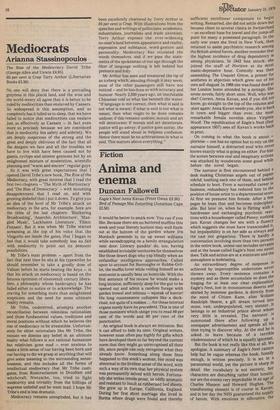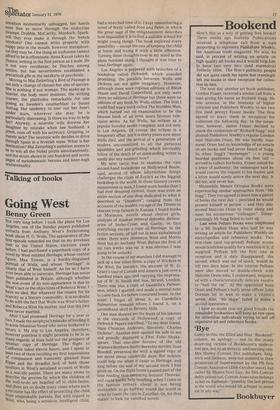Fiction
Anima and enema
Duncan Fallowell
Eagle's Nest Anna Kavan (Peter Owen £3,50) Bird of Passage Mai Zetterling (Jonathan Cape £2.50) It would be better to smirk now. You can if you like. Because there are no buttered muffins this week and your literary horizon may well fizzle out at the bottom of the garden where Iris Murdoch pretends to tie up sweet williams while eavesdropping on a family strangulation next door. Literary pundits' do, too, having established inviolable territories for themselves like those desert dogs who yap blindly when an unfamiliar intelligence approaches. Called upon to account for Burroughs or Robbe-Grillet, the muffin lover while veiling himself as an anatomist is usually bent on homicide. With the first sentence of his review he would make a long incision, sufficiently deep for the gut to be opened out and admit a random forage with garden trowel and mittens — squeak of horror! His long countenance collapses like a deckchair, not quite of a sudden ... for these internal organs surely have no precedent. This is one of those monsters which oblige you to read 80 per cent of the words and 60 per cent of the punctuation.
An original book is always an intrusion. But it can afford to bide its time. Original writers, however must often pay highly for gifts which have developed them so far beyond the current norm that they might go unrecognised all their life, since people can only recognise what they already know. Something along these lines happened to this week's woman. Her mind was abnormal in the liveliest sense of the word, with such a way of its own that her physical system was permanently salved with heroin. Fortunately she writes tensile prose, as oddly aromatic and resistant to insult as rubberised bed sheets. She grew up in• Europe, California, England. During her first short marriage she lived in Burma where drugs were found and thereby sufficient rectilinear composure to begin writing. Remarried, she did not settle down but became client to several clinics in Switzerland — an excellent base for travel and the jump-off point for many a possessed paragraph. In the early war years she lived in New York, then returned to assist psychiatric research among the British armed forces, another reminder that the highest incidence of drug dependency is among physicians. In 1942 fate struck: she joined the staff of Horizon at its most manic-depressive hour. Connolly was then assembling The Unquiet Grave, a primer for aesthetes in abjection which grew out of his own self-disgust' . In 1968 she was found dead at her London home attended by a syringe. She wrote novels, fairly short ones. Well, who was she? Correct, Anna Kavan, and if you did not know, go straight to the top of the column and start again: Anna Kavan needs you, she is back in town and bigger than ever, the most remarkable female novelist since Virginia Woolf. The republication of Eagle's Nest (first appearance 1957) sees all Kavan's works back in print.
On coming to what the book is about — plotwise — one has no option but to rely on the narrator himself, a distracted soul who never knows exactly what is going on either. For him the screen between real and imaginary actions was attacked by woodworm some good while before the novel began.
The narrator is first encountered behind a desk making Christmas angels out of paPier mAchd, loathing each one of them, and behind schedule to boot. From a successful career in business, redundancy has reduced him to the position of house artist to a departmental store. At first we presume him female. After a few pages he loses that and becomes indecipherable. But later on, when he is flirting with a hairdresser and exchanging psychotic reactions with a housekeeper called Penny, nothing jars. Kavan changes her sex with a fluency which suggests she must have transcended it, but impalpability is on her side as always and the cast not gregarious. There is hardly a conversation involving more than two persons in the entire book, unless one includes servants and at the house called Eagle's Nest one never does. Talk and action are at a minimum and the atmosphere is inebriating. An extraordinary degree of suspense is achieved by imperceptible undertones never thrown away. Every sentence contains a mystery and as these accumulate so does the longing for at least one clear explanation. Eagle's Nest, lost in mountainous deserts and skirted by immense gardens, is directly from the mind of Citizen Kane, alias William Randolph Hearst, a gilt dream turned into stone, vast, underpopulated, very sinister. It belongs to an industrial prince about whom very little is revealed. The narrator is summoned there after following up a newspaper advertisement and spends all his time trying to discover why. At the end he is asked to leave because of a terrible misdemeanour of which he is equally ignorant. But the book is not really like this at all. We apologise. A summary of Eagle's Nest cannot help but be vague whereas the book, funnily enough, is written precisely. It is set in a paranormal world, yet the picture is sharp in detail. Her vocabulary is not esoteric, her characters are disturbing rather than lunatic, nor are the events very improbable in an age of Charles Manson and Howard Hughes. The transforming element is of course in Kavan;
and in her day the NHS guaranteed the supPlY attention momentarily unbugged, her hands were free to move through the endocrine swamps. Drabble, McCarthy, Murdoch, Spark: will they ever make it through the french windows? One cannot write properly with nappy pins in the mouth, however metaphorical they may be. One thing an authoress cannot afford to be is effeminate. Anna Kavan takes no chance, writing in the first person as a male. He is not very rectilinear, he flinches among nettles, but has nevertheless established a precariou's gite in the outskirts of psychosis.
Moving to Mai Zetterling's Bird of Passage is not only a change of climate but also of species. She is nothing if not woman. The make-up is heavier, the body more insistent, the writing coarser, the platitudes remarkable for one Posing as Sweden's counterblast to Susan Sontag. Her tendency to tear out her heart, under stars, wherever she may be is Particularly distressing. Is there no way to help her? Anyway, a neurotic wife drowns her daughter by mistake when her husband, a Priest, runs off with his secretary. Gripping, or merely sick? The neurotic wife decides to drive through Spain in a feverish mess. What is her destination? Mai Zetterling's ambition seems to be to win all the Nobel prizes simultaneously, and the strain shows in one hundred and seven Pages of melodramatic hernias and knee-high sentimentality.



























 Previous page
Previous page